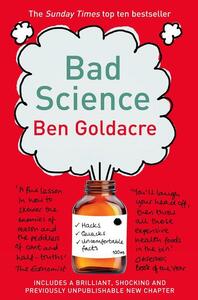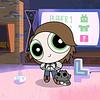Take a photo of a barcode or cover
This was a very good book that I did not like. The author clearly knows what he's talking about. Unfortunately, sometimes it's hard for the reader to know what he's talking about. In a bold effort to make scientific skepticism accessible to the everyday reader, Goldacre buries the gems in a pile of confusing statistics, all valid statistics backing up his insightful, important claims to show he's done the research and knows what he's talking about, but muddling statistics. I wish he'd stuck the statistics in appendices. I am excited to learn more about him through his blog, as I loved his insights and would prefer them in lower doses, so to speak.
I won't read medical or science news stories uncritically again after reading this book.
I almost abandoned this book in the middle because I started to feel the author was telling me the same thing over and over--"I get it!" I wanted to say--but I kept with it. The last few chapters picked up, and the final section on MMR vaccines was worth reading through the slower parts.
There's a passage in one of the middle chapters that mentions the problem of relying on hunches or feelings instead of data. I couldn't help but think about all the fervor over Nate Silver's predictions for the election being more accurate than so many pundits. Nate Silver made his predictions using data whereas several pundits have admitted they didn't.
I almost abandoned this book in the middle because I started to feel the author was telling me the same thing over and over--"I get it!" I wanted to say--but I kept with it. The last few chapters picked up, and the final section on MMR vaccines was worth reading through the slower parts.
There's a passage in one of the middle chapters that mentions the problem of relying on hunches or feelings instead of data. I couldn't help but think about all the fervor over Nate Silver's predictions for the election being more accurate than so many pundits. Nate Silver made his predictions using data whereas several pundits have admitted they didn't.
Took me a long time to read because I kind of got bored of the tone halfway through, but I picked it up later and managed to finish it off. Particularly liked the stuff about the ethics of placebo trials, even though wrapping my head around just how placebos actually have an effect was very difficult. Also liked Goldacre's view that he doesn't crucify people for utterances, but does hold them accountable for published materials in their name. I also liked how, when discussing bogus science, he does mention any positive side effects to balance the argument a little. Very interested by the Hawthorne effect, and the complexities of carrying out psychological trials on humans, as well as the incredibly questionable Durham fish oil trials (durhamtrial.org).
Would recommend as reading for the science-inclined, especially if you have to conduct some sort of experiment. Great stuff.
Would recommend as reading for the science-inclined, especially if you have to conduct some sort of experiment. Great stuff.
The second time I have read this and I stand by the assertion that this book should be mandatory in every GCSE science class. It is easy to read, accessible and passionate in correcting stupid and dreadful practice in scientific academia, pharmaceutical industry, government and journalism.
The title is already provoking. "Bad Science". There is no such thing, just like there is no bad knife, or bad hydrogen. Let's take the knife - I can use it to cut veggies for a nice meal, or be clumsy, drop it and stab myself in a foot, or commit a cold blood murder with robbery.
The stories in this book fall into the clumsy and the cold blood categories. The clumsy is the misinterpretation with good intentions. The cold blood is twisting existing research or creating results out of thin air to suit the purpose. The purpose is almost always the same. Ego driven need for fame and hunger for money.
I started reading grinning to myself. The book begins lightly, exposing diet and healthy lifestyle fads. The detox! (look up the history of the word if you want some fun on the side). Then it gets darker, and soon my grin was gone. When the 'fads' and silly trends cross over into fake cures for AIDS and cancer and people start to die, then it's no longer funny but horrific and outrageous. This book exposes the mechanism of such outrages, the whole chain from the source which can be a genuine research done badly, or something just dressed as 'research' but financed by someone who will profit from the results and therefore the result is set before even such 'research' begins. Then there are people who bring the findings to the masses - the media or as the author calls them 'the churnalists'. Their hunger for the limelight, their scramblings to stay there. Then there are the people who are fed these 'news', the addicts who abandon all their ability to think clearly under the avalanche of confusing information. It is so easy to drown, to give up the fight for the truth.
I am so glad I've found this book. I was always aware of the importance of objective, thorough scientific method. Long time ago when I was still studying (mathematics) I did a semester of statistics with psychology students, out of curiosity. Some of them had such disdain for hard maths as a tool. Others struggled with the concept of variables and abstract thinking. It was such an eye opener for me. So I don't have much problem with debunking fake-ism when I see it. The book gives me motivation - and tools - for informed debate. I usually tend to keep quiet around people of different opinion. It's their problem, I think. I know what I know. This book made me realise that we all need to fight for the truth and we need to be well armed for that. Armed with facts, quotes and valid sources and ability to discern what is what. This book shows us how.
The stories in this book fall into the clumsy and the cold blood categories. The clumsy is the misinterpretation with good intentions. The cold blood is twisting existing research or creating results out of thin air to suit the purpose. The purpose is almost always the same. Ego driven need for fame and hunger for money.
I started reading grinning to myself. The book begins lightly, exposing diet and healthy lifestyle fads. The detox! (look up the history of the word if you want some fun on the side). Then it gets darker, and soon my grin was gone. When the 'fads' and silly trends cross over into fake cures for AIDS and cancer and people start to die, then it's no longer funny but horrific and outrageous. This book exposes the mechanism of such outrages, the whole chain from the source which can be a genuine research done badly, or something just dressed as 'research' but financed by someone who will profit from the results and therefore the result is set before even such 'research' begins. Then there are people who bring the findings to the masses - the media or as the author calls them 'the churnalists'. Their hunger for the limelight, their scramblings to stay there. Then there are the people who are fed these 'news', the addicts who abandon all their ability to think clearly under the avalanche of confusing information. It is so easy to drown, to give up the fight for the truth.
I am so glad I've found this book. I was always aware of the importance of objective, thorough scientific method. Long time ago when I was still studying (mathematics) I did a semester of statistics with psychology students, out of curiosity. Some of them had such disdain for hard maths as a tool. Others struggled with the concept of variables and abstract thinking. It was such an eye opener for me. So I don't have much problem with debunking fake-ism when I see it. The book gives me motivation - and tools - for informed debate. I usually tend to keep quiet around people of different opinion. It's their problem, I think. I know what I know. This book made me realise that we all need to fight for the truth and we need to be well armed for that. Armed with facts, quotes and valid sources and ability to discern what is what. This book shows us how.
very informative stuff, and a sense of humor to boot. it's a bit pedantic, but i perfectly understand goldacre's frustration with the general ignorance concerning science. in a buyer beware market, the buyer is required to be aware. and shamelessly stupid and dishonest people profit when they are not.
unsurprising is the info debunking kinoki foot pads, ionic foot baths, and homeopathy as a whole. was surprised though by the chapter on the placebo effect and some of the big pharma info. the writing is pretty cheeky, not award winning stuff, but entertaining and interesting with some priceless quotes sprinkled throughout.
unsurprising is the info debunking kinoki foot pads, ionic foot baths, and homeopathy as a whole. was surprised though by the chapter on the placebo effect and some of the big pharma info. the writing is pretty cheeky, not award winning stuff, but entertaining and interesting with some priceless quotes sprinkled throughout.
I rarely enjoy non-fiction books. Disappointingly, I don't often have the patience for anything much longer than a newspaper article or blog post.
But I loved this. Educational, entertaining, challenging - it's a great book. I wish my school teachers had had half of the talent and passion for explaining science in an approachable way that you find in this book - I might have stuck with science a little longer.
But I loved this. Educational, entertaining, challenging - it's a great book. I wish my school teachers had had half of the talent and passion for explaining science in an approachable way that you find in this book - I might have stuck with science a little longer.
Ben Goldacre has been going after bad science for quite a while, especially big pharma and drug trials.
This book is a great read - funny but insistent that we all arm ourselves with the basic tools to question all of the information out their about our health.
He takes on questionable foot bath and drug trials, but reserves special laser analysis for the many "stories" out there about vaccines and autism and the whole field of homeopathy.
That advanced stats course I took at university is actually pretty handy.
If you want to check him out, he has a blog: http://www.badscience.net/.
This book is a great read - funny but insistent that we all arm ourselves with the basic tools to question all of the information out their about our health.
He takes on questionable foot bath and drug trials, but reserves special laser analysis for the many "stories" out there about vaccines and autism and the whole field of homeopathy.
That advanced stats course I took at university is actually pretty handy.
If you want to check him out, he has a blog: http://www.badscience.net/.



